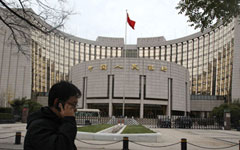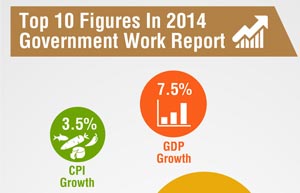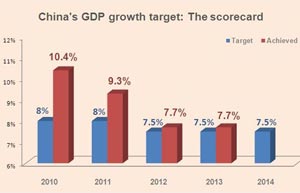Chinese regulators lend support for competition
Updated: 2014-03-07 14:02
(Xinhua)
|
|||||||||||

|
|
 |
"Ultimately we will have to rely on competition," said Miao Wei, minister of industry and information technology (MITT), when commenting on China's 4G charges, widely deemed too high for customers.
Speaking to reporters on the sidelines of this year's annual sessions of China's national legislature and political advisory body, Miao said the MITT had noticed public concerns over the 4G charges.
"But the government will only play a tiny role here," he said.
"I'm sure competition can do the job," he said, adding that the MIIT had issued licenses for mobile telecom resale business to 19 private companies by the end of 2013, a major step forward in the opening of the basic telecom industry to private capital.
His comments came as traditionally State-controlled industries are facing increasing pressure from technology-enabled ventures looking to ease barriers for competition in key sectors of the economy.
In the most notable case, online finance fund Yu'ebao, launched in June last year by e-commerce giant Alibaba, has attracted more than 81 million users and over 500 billion yuan ($81 billion) in assets by paying interest rates of up to 6 percent on mobile phone-accessible accounts.
The rate is almost twice that of traditional banks, which only pay a maximum 3.3 percent for one-year deposits. Alibaba's rivals, such as Tencent Holdings Ltd and Sina Corp, are also launching similar services.
Such a big migration of money has eaten up much of the traditional banks' profits. The good old days when banks could reap huge gains simply by absorbing deposits with low costs and provide loans at a much higher rate seem to be over, at least for now.
Next in line came the taxi industry, another monopoly stronghold, in which drivers are required to register with taxi companies and pay monthly vehicle rental and management fees.
Cab-calling services have become an unexpected battlefield between Tencent and Alibaba, which have been locked in a fierce race to attract customers by offering generous rebates to both drivers and passengers to use their cab-booking smart phone apps and payment systems.
The apps essentially allow customers and drivers to cooperate to break through government price controls on fares to negotiate a market price for transportation.
Read more:
|
 |
 |
Related Stories
Chinese regulators lend support for competition 2014-03-07 11:52
New rules to make low-cost airlines more competitive 2014-03-03 10:12
The First International Loulan Tourism Product Design Competition kicks off 2014-02-28 15:56
Over 600 contestants take part in Twelfth Tai’an Singer Competition 2014-02-24 11:17
Today's Top News
Crimea to vote on joining Russia, referendum called
Sarkozy to sue over secret audio
Crackdown only targets terrorists
Medical workers call for harmony
Tech needed to improve air
China wants respect for all Ukrainian ethnic groups
Premier puts the accent on reform
Military spending boost moderate
Hot Topics
Lunar probe , China growth forecasts, Emission rules get tougher, China seen through 'colored lens', International board,
Editor's Picks

|

|

|

|

|

|





